|
|
|
Sort Order |
|
|
|
Items / Page
|
|
|
|
|
|
|
| Srl | Item |
| 1 |
ID:
122363
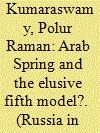

|
|
|
|
|
| Publication |
2013.
|
| Summary/Abstract |
If the Arab Spring were to bring about meaningful changes to Arab societies, what is needed is a political order that is not only democratic but also inclusive. To be credible, the Arab world, including its Islamists, will have to tread the long and painful path of consensus building. This method is inclusive and hence more enduring than electoral democracy.
|
|
|
|
|
|
|
|
|
|
|
|
|
|
|
|
| 2 |
ID:
099869
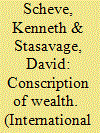

|
|
|
|
|
| Publication |
2010.
|
| Summary/Abstract |
The dominant narrative of the politics of redistribution in political science and economics highlights the signature role of the rise of electoral democracy and the development of political parties that mobilize working-class groups. We argue in this article that this narrative ignores the critical role played by mass warfare in the development of redistributive public policies. Focusing attention on the determinants of progressive taxation, we argue that mobilization for mass warfare led to demands for increased taxation of the wealthy to more fairly distribute the burden for the war effort. We then show empirically that during the past century, mass mobilization for war has been associated with a notable increase in tax progressivity. In the absence of war, neither the establishment of universal suffrage, nor the arrival of political control by parties of the left is systematically associated with large increases in tax progressivity. In making these arguments, we devote particular attention to a "difference-in-differences" comparison of participants and nonparticipants in World War I.
|
|
|
|
|
|
|
|
|
|
|
|
|
|
|
|
| 3 |
ID:
119427


|
|
|
|
|
| Publication |
2013.
|
| Summary/Abstract |
Although the role of intelligence services has been addressed in many recent discussions of the democratization process, yet it has not yet generally been pursued sufficiently by academics and politicians. 1 Mongolia and its intelligence services have been among those countries undergoing a democratic transition and consolidation process. Mongolia is the only formerly Communist Asian state whose democratization process has not regressed. In fact, since 1990, electoral democracy has become the "only game in town," where space for a vibrant civil society exists, and the security institutions have remained outside of the political and economic contests. 2 Approval in early 2012 of the law on conflicts of interest, a set of laws concerning the judiciary, revisions of the election law, and a sustained public demand for good governance are signs of a healthy nascent democracy, one which admittedly still has room for improvement. 3 Unique in the region, Mongolia's security organizations-the military, intelligence agencies, and police-have remained mostly outside of this political transformation. The role of these security institutions in the quest for democratization has often been ignored because of a misperception about their roles and centrality, and the reality of the Soviet military presence in Mongolia during the Cold War.
|
|
|
|
|
|
|
|
|
|
|
|
|
|
|
|
| 4 |
ID:
093698
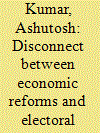

|
|
|
|
|
| Publication |
2009.
|
| Summary/Abstract |
Indian democracy is being globally acclaimed for its 'twin successes', namely achieving an impressive market reforms-driven economic growth in recent years notwithstanding ongoing global recession, accompanied with a consistent practice of democracy. Against the grain of such celebration of the 'widening' and 'deepening' of democracy in India under the shadow of globalization, the article argues that even though competitive politics is being understood as an essential 'democratic minimum' that cannot be dispensed with at the same time the concurrent depoliticization of policy process also ensures that it need not intervene in the substantive issue of economic policy. The article makes this point by visiting India's electoral politics since the initiation of neo-liberal economic reforms and taking note of the marked disconnect between the two.
|
|
|
|
|
|
|
|
|
|
|
|
|
|
|
|
| 5 |
ID:
128843
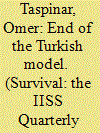

|
|
|
|
|
| Publication |
2014.
|
| Summary/Abstract |
The Turkish model of democracy, economic competence and regional influence is not unravelling because of a clash between Islam and secularism. The real conflict is between electoral democracy and liberalism.
|
|
|
|
|
|
|
|
|
|
|
|
|
|
|
|
| 6 |
ID:
093618
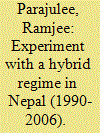

|
|
|
| 7 |
ID:
116105
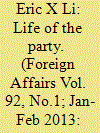

|
|
|
|
|
| Publication |
2013.
|
| Summary/Abstract |
In November 2012, the Chinese Communist Party (CCP) held its 18th National Congress, setting in motion a once-in-a-decade transfer of power to a new generation of leaders. As expected, Xi Jinping took over as general secretary and will become the president of the People's Republic this March. The turnover was a smooth and well-orchestrated demonstration by a confidently rising superpower. That didn't stop international media and even some Chinese intellectuals, however, from portraying it as a moment of crisis. In an issue that was published before the beginning of the congress, for example, The Economist quoted unnamed scholars at a recent conference as saying that China is "unstable at the grass roots, dejected at the middle strata and out of control at the top." To be sure, months before the handover, the scandal surrounding Bo Xilai, the former party boss of the Chongqing municipality, had shattered the CCP's long-held facade of unity, which had underwritten domestic political stability since the Tiananmen Square upheavals in 1989. To make matters worse, the Chinese economy, which had sustained double-digit GDP growth for two decades, slowed, decelerating for seven straight quarters. China's economic model of rapid industrialization, labor-intensive manufacturing, large-scale government investments in infrastructure, and export growth seemed to have nearly run its course. Some in China and the West have gone so far as to predict the demise of the one-party state, which they allege cannot survive if leading politicians stop delivering economic miracles.
|
|
|
|
|
|
|
|
|
|
|
|
|
|
|
|
| 8 |
ID:
118511
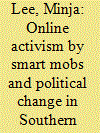

|
|
|
| 9 |
ID:
117649
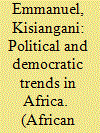

|
|
|
|
|
| Publication |
2012.
|
| Summary/Abstract |
The introduction of multiparty politics in Africa and the resultant electoral democracy have had mixed outcomes in Africa. While there has been a general improvement in the continent's body politic and governance outlook, there have also been incidences where the democratic project has, by default or design, undermined or been undermined by Africa's structural fault lines that have led to relapses into instability and violence. This article reflects on the democratic project, particularly on the aspect of electoral democracy, by revisiting its trajectory and examining its challenges and prospects on the continent.
|
|
|
|
|
|
|
|
|
|
|
|
|
|
|
|
| 10 |
ID:
159539
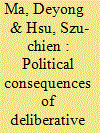

|
|
|
|
|
| Summary/Abstract |
Recent research suggests that both electoral democracy and deliberative democracy under a nondemocratic regime may help to sustain existing authoritarian rule but is likely to eventually lead to the democratization of authoritarian regimes by eroding its basis in the long term. However, few studies have used comparative methods to empirically analyze the political effects of these two types of democracy together. In this article, we use survey data and in-depth interviews to empirically analyze two local political reform experiments in China. Four fieldwork sites were selected: two where democratic experiments have been implemented and two where no political reform has been implemented. We compared the political consequences of the two locations of democratic reform experimentation using indicators such as political trust, administrative performance, and democratic aspirations. The results show that the electoral democracy experiment delivered better governance and higher political legitimacy than the deliberative democracy experiment, while deliberative democracy performs better than the usual township governance system. Although the results show that the electoral democracy experiment fosters higher democratic aspiration, strong evidence verifying the causal mechanism between deliberative democracy experiment and appeals for democracy has not been found. Based on the empirical findings, we discuss the implications of the two experiments for China's politics.
|
|
|
|
|
|
|
|
|
|
|
|
|
|
|
|
| 11 |
ID:
095456
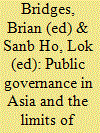

|
|
|
|
|
| Publication |
Cheltenham, Edward Elgar, 2010.
|
| Description |
xi, 297p.
|
| Standard Number |
9781848446281, hbk
|
|
|
|
|
|
|
|
|
|
|
|
Copies: C:1/I:0,R:0,Q:0
Circulation
| Accession# | Call# | Current Location | Status | Policy | Location |
| 054931 | 321.8/BRI 054931 | Main | On Shelf | General | |
|
|
|
|
| 12 |
ID:
105272
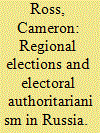

|
|
|
| 13 |
ID:
133022


|
|
|
|
|
| Publication |
2014.
|
| Summary/Abstract |
According to indicators of political repression currently used by scholars, human rights practices have not improved over the past 35 years, despite the spread of human rights norms, better monitoring, and the increasing prevalence of electoral democracy. I argue that this empirical pattern is not an indication of stagnating human rights practices. Instead, it reflects a systematic change in the way monitors, like Amnesty International and the U.S. State Department, encounter and interpret information about abuses. The standard of accountability used to assess state behaviors becomes more stringent as monitors look harder for abuse, look in more places for abuse, and classify more acts as abuse. In this article, I present a new, theoretically informed measurement model, which generates unbiased estimates of repression using existing data. I then show that respect for human rights has improved over time and that the relationship between human rights respect and ratification of the UN Convention Against Torture is positive, which contradicts findings from existing research.
|
|
|
|
|
|
|
|
|
|
|
|
|
|
|
|
| 14 |
ID:
095001
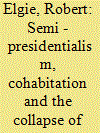

|
|
|
| 15 |
ID:
095005
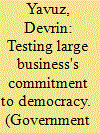

|
|
|
| 16 |
ID:
095082
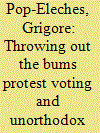

|
|
|
|
|
| Publication |
2010.
|
| Summary/Abstract |
The electoral rise of unorthodox parties (UOPs) in recent East European elections raises some puzzling questions about electoral dynamics in new democracies. Why did the power alternation of the mid-1990s not result in party-system consolidation, as suggested by some earlier studies, but instead give way to a much more chaotic environment in which established mainstream political parties lost considerable ground to new political formations based on personalist and populist appeals? Why did this reversal in Eastern Europe happen during a period of economic recovery, remarkable Western integration progress, and a broad acceptance of electoral democracy as the only game in town? This article suggests that these electoral dynamics can be explained by focusing on the interaction between protest voting and election sequence. While protest voting to punish unpopular incumbents has been a widespread but understudied practice since the collapse of communism, the beneficiaries of these protest votes have changed in recent elections. Whereas in the first two generations of postcommunist elections, disgruntled voters could opt for untried mainstream alternatives, in third-generation elections (defined as elections taking place after at least two different ideological camps have governed in the postcommunist period) voters had fewer untried mainstream alternatives, and therefore opted in greater number for unorthodox parties. This explanation receives strong empirical support from statistical tests using aggregate data from seventy-six parliamentary elections in fourteen East European countries from 1990 to 2006, survey evidence from twelve postcommunist elections from 1996 to 2004, and a survey experiment in Bulgaria in 2008.
|
|
|
|
|
|
|
|
|
|
|
|
|
|
|
|
| 17 |
ID:
169325
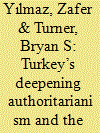

|
|
|
|
|
|
|
|